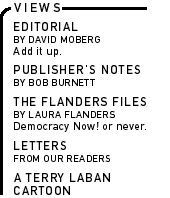
|

|

|

|
| |
|
|
|
Liberty's Excess Every so often one encounters a work of fiction whose language, imagery and form are so startling and provocative that one emerges from the reading into a world made suddenly strange. Each word acts like a jolt from a pneumatic drill, pulverizing into dust the mind's settled ways of seeing. Such was my state upon finishing this collection of 14 stories by Lidia Yuknavitch. And though I want every last person in America to know of its existence, I also realize it is not likely to be reviewed in the more somber arenas of mainstream book chat. For one thing, it's published in paperback by a small press without a massive marketing budget. What's worse, it's actually--and intentionally--difficult. Any profoundly original work of literature begs a reciprocal expansiveness, an abandonment of the soothing clichˇ and easy adjective (luminous! resonant!) on the part of the critic--rather too tall an order for the drones of the publishing world's blurb factories. But pardon my churlishness. Chalk it up to a feeling of having been born too late, long after the day when verbal (and sometimes literal) fisticuffs could be kicked up by an avant-garde work of literature such as Naked Lunch. It's not an example I choose lightly or at random; Yuknavitch is, in many ways, a spiritual heiress to the work of William Burroughs (and also Kathy Acker, to whom Yuknavitch's book is dedicated). This is clear from the very first image of the very first story, "Bravo America": First thing in the morning, when I take out the trash, I see it: syringe on the lawn. Still bloody. Surreal, isn't it. First memory like a shot in the vein. Four long years of youth sliding cold silver glint into waiting blue. This is the voice of a reformed junkie, a voice we will encounter again in other stories. Whether or not it is the voice of the same character is difficult to discern and, we come to see, beside the point. For, like her literary forebears, Yuknavitch generally dispenses with "character development," preferring instead to practice a technique similar to the one Burroughs called "the routine." Characters appear and disappear within a page or two. The narrator, if and when one exists, generally acts as more of a ventriloquist than a conventional storyteller. Story form itself becomes a metaphor for the multiple-personality disorders of capitalist democracy.
|

